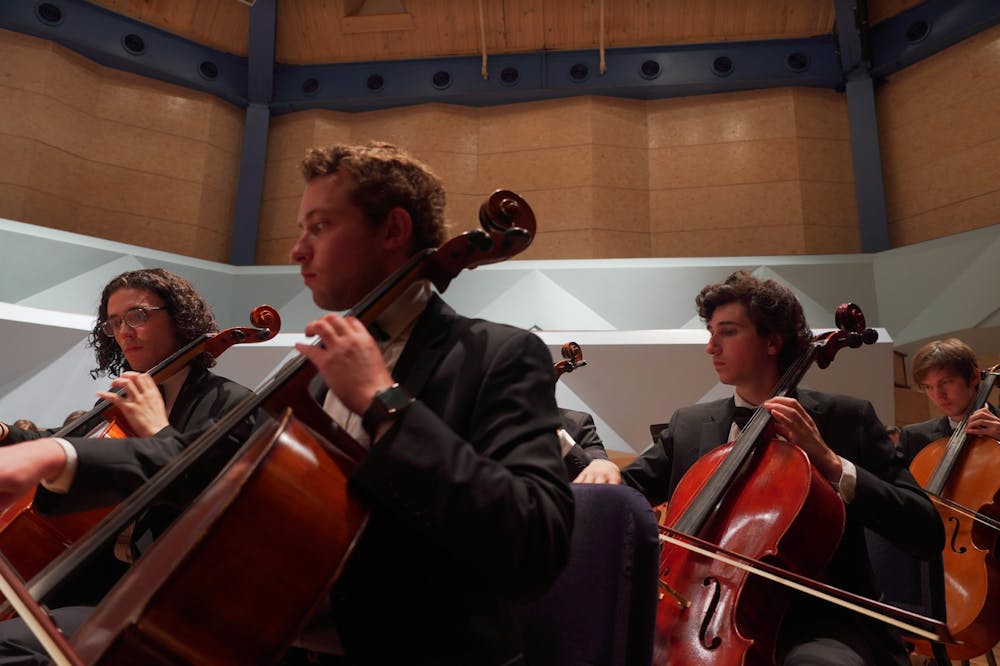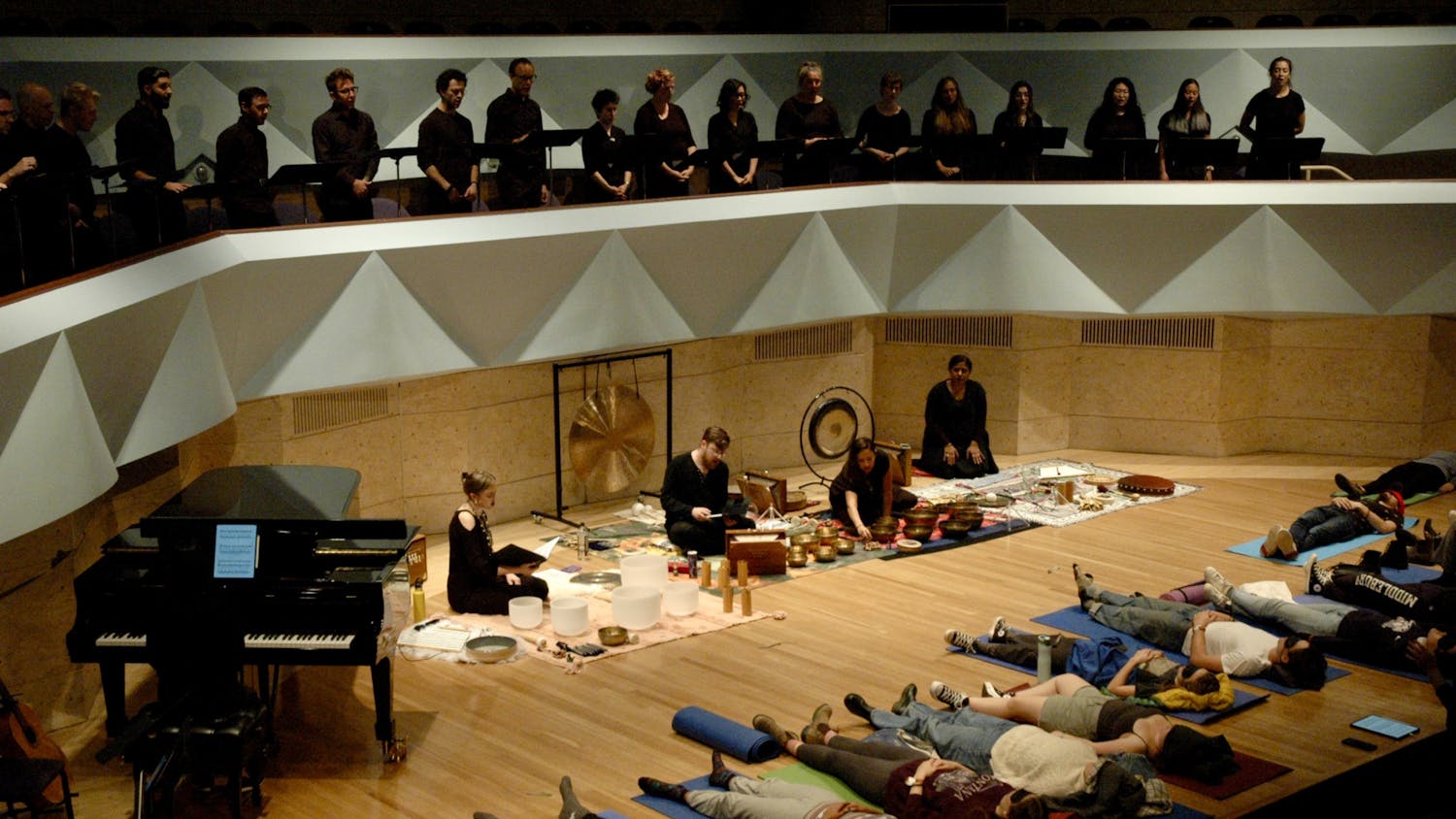The Middlebury College Orchestra held its fall concert on the evening of Saturday, Nov. 12 at the Olin C. Robison Concert Hall in the Mahaney Arts Center. Over the course of two hours the group of nearly 70 student musicians and visiting professionals played to a packed hall of Middlebury students, parents and community members. Leading the orchestra was conductor Evan Bennett, a Juilliard-trained musician who also directs the Northeastern University Symphony Orchestra.
The concert’s program consisted of three seminal compositions spanning from the Classical period to the golden age of Hollywood, specifically Mozart’s 1791 overture to “Die Zauberflöte” (“The Magic Flute”), César Franck’s 1889 “Symphony in D Minor” and Bernard Herrmann’s 1958 suite for Alfred Hitchcock’s “Vertigo.” A performance of such ambitious music demands significant time and dedication to prepare for, a challenge that cellist Will Procter ’24 insists the orchestra was willing to undertake.
“We rehearse twice a week, Thursday and Sunday, for two hours from 7–9 p.m. So four hours a week, it’s basically more than a class,” Procter said.
Flutist Emily Le ’26 echoed Procter’s assertion of the orchestra members’ commitment, going further to mention the additional hours of practice outside of rehearsal it takes to do justice to musical icons as monumental as Mozart.
“That [full-group practice] doesn’t include all the hours we practiced on our own outside of rehearsal, which, for me at least, was a lot,” Le said. “We definitely couldn’t have gotten to where we were if we didn’t put in the extra work ourselves.”
Anyone within earshot of Robison Hall on Saturday night would likely say that this extra work paid off. The orchestra opened the concert with a beautiful rendition of Herrmann’s “Vertigo” Suite, a score whose shrilling strings and swelling horns encapsulate in sound the hypnotic images of the Hitchcock classic. A predominantly unnerving aural experience suddenly becomes tragically romantic in the closing “Scene D’Amour,” and it was this passage of “Vertigo” that cellist S.G. Solomon ’25 enjoyed playing most.
“I felt like the music was a lot easier… for the cello at least, but there were still a couple parts in there where the things I was playing, it just kind of reminded me, like, this is why I chose this instrument, this is why I play,” Solomon said.
Procter was more attuned to the Classical period, declaring Mozart’s overture to “The Magic Flute” as his highlight of the night.
“It’s kind of your classic happy, fast, not as difficult piece… When you think of classical music, it’s kind of that stereotypical loud, fast, fun overture,” Procter explained, adding that “it really just got things exciting.”
The lively overture was the second musical offering of the night and a strong showpiece for the talents of the various sections in the orchestra, none more so than for the strings. As Bennett drove them on, the violinists raced their bows ceaselessly across their instruments to keep pace with the rapid runs strewn across their sheet music. It appeared to be a mentally and physically taxing performance, but it certainly was not in vain: the second of silence that followed the end of the piece was quickly overcome by a passionate applause from the audience.
After a 10-minute intermission, the orchestra returned to the stage and ended the night with a performance of Franck’s “Symphony in D Minor.” The group played the piece admirably, but this last selection lacked the emotional resonance of the music that preceded it. It may be because it was a bit long at roughly 45 minutes, or it may be that Franck’s composition sounded slightly dull coming after Herrmann’s cinematic suite and Mozart’s rousing overture, but the diminished energy of the final piece ultimately did not seem to matter to the audience when the concert finally drew to a close. As the last note sounded and the musicians rose to bow, the audience erupted into an enthusiastic ovation that lasted nearly two minutes. It was a fitting conclusion to a wonderful night of music, and for those who made it possible, it was another reminder of why they first joined the Middlebury College Orchestra.
“At the concerts, just knowing that I’m playing there, looking out at a full house, having this massive sound around me all coming together in this really articulate, nuanced way that all blends together, and just putting on a great show for everybody,” Procter said about why he loves the orchestral experience.
For others like Le, playing in the orchestra was the perfect way to meet new friends who shared her passion for music.
“My favorite part is definitely the friends I made, Lizzy Sherman ’26 (a fellow flutist) and Isabella Aroesty ’26 (cellist). They are some of the kindest people I’ve ever met… we are going to continue hanging out together even though practices are over,” Le said.
And then there’s orchestra members like Hans Kindstedt ’24, a French hornist whose observation of why he plays may very well cut to the essence of what it means to be a member of the Middlebury College Orchestra.
“It’s fun to sound good,” Kindstedt said.
Reflecting on Saturday night’s concert with this statement in mind, it’s safe to say he had a blast.
Jack Torpey '24 (he/him) is an Arts and Culture Editor. He writes film reviews for the Reel Critic column.
Jack is studying English with a minor in Film and Media Culture. Outside The Campus, he works as a peer writing tutor at the Writing Center and is a member of the Middlebury Consulting Group.




